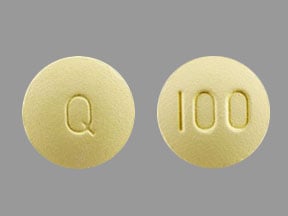
Quetiapine Coupons & Savings Card – Discount Prices from $10.52
Generic for: Seroquel
My prescription
Edit
100MG, Quetiapine (30 Tablets)
Select pharmacy

CVS
$19.17
COUPON PRICE
Walgreens
$10.52
COUPON PRICE
Albertsons
$13.58
COUPON PRICE
Walmart
$16.58
COUPON PRICEQuetiapine savings card
Show this card to your pharmacist
Walgreens
$10.52
BIN
ID
PCN
GRP
019876
LH01CC2F82
CHIPPO
LHX
Powered by
More prescriptions for schizophrenia
More prescriptions for schizophrenia
Price history for Seroquel (brand) & Quetiapine (generic)
30 Tablets, 100MG
Average retail price for Seroquel
Average retail price for Quetiapine
Average SaveHealth price for Quetiapine
Our price history data is based on aggregated prescription data collected from participating pharmacies in America. Our prescription data updates daily to reflect the latest price changes. If you notice a missing data point, it means there wasn't sufficient data available to generate a monetary value for that date.
We analyzed Quetiapine prices for (100MG, 30 Tablets) over the last 12 months. The average retail price was $136.19, while the average price using the SaveHealth discount card was $22.99. That's a savings of approximately 83.12% when using our Quetiapine coupon.
Compared to the generic version, Seroquel had an average price of $593.16 over the same time period. With the SaveHealth savings card, Quetiapine is 96.12% cheaper on average than Seroquel.
*Retail prices are based on pharmacy claims data, and may not be accurate when we don't have enough claims.
Quetiapine dosage forms
Dosage Quantity Price from Per unit 25MG 1 Tablet $9.03 $9.03 25MG 3 Tablets $9.09 $3.03 25MG 30 Tablets $9.88 $0.33 25MG 32 Tablets $9.94 $0.31 25MG 50 Tablets $10.47 $0.21 25MG 60 Tablets $10.76 $0.18 25MG 90 Tablets $17.81 $0.20 25MG 100 Tablets $18.13 $0.18 25MG 120 Tablets $18.75 $0.16 25MG 1000 Tablets $46.25 $0.05
| Dosage | Quantity | Price from | Per unit |
|---|---|---|---|
| 25MG | 1 Tablet | $9.03 | $9.03 |
| 25MG | 3 Tablets | $9.09 | $3.03 |
| 25MG | 30 Tablets | $9.88 | $0.33 |
| 25MG | 32 Tablets | $9.94 | $0.31 |
| 25MG | 50 Tablets | $10.47 | $0.21 |
| 25MG | 60 Tablets | $10.76 | $0.18 |
| 25MG | 90 Tablets | $17.81 | $0.20 |
| 25MG | 100 Tablets | $18.13 | $0.18 |
| 25MG | 120 Tablets | $18.75 | $0.16 |
| 25MG | 1000 Tablets | $46.25 | $0.05 |
| 50MG | 1 Tablet | $9.04 | $9.04 |
| 50MG | 7 Tablets | $9.26 | $1.32 |
| 50MG | 30 Tablets | $10.11 | $0.34 |
| 50MG | 50 Tablets | $10.85 | $0.22 |
| 50MG | 60 Tablets | $11.22 | $0.19 |
| 50MG | 90 Tablets | $18.15 | $0.20 |
| 50MG | 100 Tablets | $18.50 | $0.18 |
| 50MG | 120 Tablets | $19.20 | $0.16 |
| 50MG | 1000 Tablets | $47.30 | $0.05 |
| 100MG | 30 Tablets | $10.52 | $0.35 |
| 100MG | 1 Tablet | $9.05 | $9.05 |
| 100MG | 15 Tablets | $9.76 | $0.65 |
| 100MG | 33 Tablets | $10.67 | $0.32 |
| 100MG | 45 Tablets | $11.27 | $0.25 |
| 100MG | 50 Tablets | $11.53 | $0.23 |
| 100MG | 60 Tablets | $12.03 | $0.20 |
| 100MG | 90 Tablets | $19.76 | $0.22 |
| 100MG | 100 Tablets | $20.29 | $0.20 |
| 100MG | 120 Tablets | $21.35 | $0.18 |
| 100MG | 1000 Tablets | $55.30 | $0.06 |
| 100MG | 6000 Tablets | $200.30 | $0.03 |
| 150MG | 30 Tablets | $37.50 | $1.25 |
| 150MG | 100 Tablets | $107.42 | $1.07 |
| 200MG | 1 Tablet | $9.09 | $9.09 |
| 200MG | 15 Tablets | $10.37 | $0.69 |
| 200MG | 30 Tablets | $11.75 | $0.39 |
| 200MG | 33 Tablets | $12.02 | $0.36 |
| 200MG | 50 Tablets | $13.58 | $0.27 |
| 200MG | 60 Tablets | $14.49 | $0.24 |
| 200MG | 90 Tablets | $22.75 | $0.25 |
| 200MG | 100 Tablets | $23.61 | $0.24 |
| 200MG | 120 Tablets | $25.34 | $0.21 |
| 200MG | 500 Tablets | $46.90 | $0.09 |
| 200MG | 1000 Tablets | $67.50 | $0.07 |
| 200MG | 3000 Tablets | $149.90 | $0.05 |
| 200MG | 6000 Tablets | $273.50 | $0.05 |
| 300MG | 1 Tablet | $9.13 | $9.13 |
| 300MG | 10 Tablets | $10.32 | $1.03 |
| 300MG | 28 Tablets | $12.70 | $0.45 |
| 300MG | 30 Tablets | $12.96 | $0.43 |
| 300MG | 50 Tablets | $15.60 | $0.31 |
| 300MG | 60 Tablets | $16.92 | $0.28 |
| 300MG | 90 Tablets | $26.38 | $0.29 |
| 300MG | 100 Tablets | $27.65 | $0.28 |
| 300MG | 120 Tablets | $30.18 | $0.25 |
| 300MG | 500 Tablets | $63.80 | $0.13 |
| 300MG | 1000 Tablets | $101.30 | $0.10 |
| 300MG | 3000 Tablets | $251.30 | $0.08 |
| 400MG | 1 Tablet | $2.69 | $2.69 |
| 400MG | 30 Tablets | $8.26 | $0.28 |
| 400MG | 50 Tablets | $12.10 | $0.24 |
| 400MG | 90 Tablets | $26.27 | $0.29 |
| 400MG | 100 Tablets | $28.19 | $0.28 |
| 400MG | 500 Tablets | $63.80 | $0.13 |
| 400MG | 1000 Tablets | $101.30 | $0.10 |
| 400MG | 2400 Tablets | $206.30 | $0.09 |
| 400MG | 3000 Tablets | $251.30 | $0.08 |
